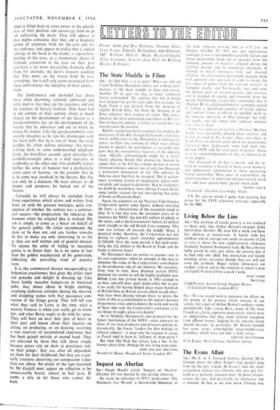The State Muddle in Films
-J
ii
ri 0 EA2
ED
Front : John and Roy Boulting, Thomas Adler. Tony Lynes, Titnothy Bellingham, Ian Gilmour, MP. William McCall. Hugh Heckstall-Smith, Tibor Szanutely. lean Gtahant Hall. Sir William Hayter, B. Engert.
SIR.—So Old Nick is at it again! When our old old friend Nicholas Davenport refers, not without justi- fication, to 'the State muddle in films (sPI:crn tog, October 28) he goes on, alas. to make 'confusion worse confounded.' No surprise this, but it would have helped if he got his facts right. For example, the Eady Fund is not derived 'from the showing of eligible British films,' but from the showing of all films, whatever their country of origin. This makes America the most substantial contributor to Britain's film production subsidy; a failure to record this fact misrepresents the position.
Rightly castigating the Government for rushing the emergency Films Bill through Parliament a few days before publication of the Monopolies Commission's report on films (the contents of which were already known to them!), he nevertheless at no point sug- gests that the monopolistic structure of the industry (now officially acknowledged) might be a factor vitally affecting British film production. Instead he argues that, as the US has a home market of twenty thousand cinemas, and we one of only two thousand, a permanent domination of our film industry by America must therefore be accepted. This is accoun- tancy reasoning devoid of imagination, policy with- out pride and soaked in defeatism. Had he lived then. no doubt he would have been offering Francis Drake some similar reasons for not interrupting that game of bowls on Plymouth Hoe!
Again, his judgment on the National Film Finance Corporation quotes some figures without revealing the facts—a characteristic of the economist mind at play. It is true that over the seventeen years of its existence the NFFC has lost VII million of which, at the outset, and at the Government's behest, £3 million went straight to the old British Lion company. This sum was written off towards the middle 'fifties. I practical terms, therefore, the Corporation has lost during its eighteen years' existence approximately £1,500,000. Over the same period, it has paid some- thing like f2-I million to the Board of Trade and the banks in interest alone!
Mr Davenport does no service to anyone—nor to his own reputation—when he attempts in this way to minimise the value of the Corporation's contribution to the production side of our industry. We ourselves, from time to time, have disputed certain NFFC decisions (its resolve to sell the highly profitable new British Lion into private hands in 1963 seemed to us then, and still does, quite deplorable); but to give it no credit for having helped place many hundreds of British films on British screens which would other- wise have been playing foreign films; to ignore the value of this as a contribution to the nation's balance of payments crisis; and to dismiss the work and worth of those who seek the Corporation's assistance, is to see things through a glass very darkly!
As to Nicholas Davenport's own proposal for the future functioning of the NFFC—state contracts to those of our best producers and directors putting in, presumably, the lowest 'tenders for film making on cultural subjects'—it need only be restated to cause, as Punch used to have it, 'collapse of stout party' ! But then Old Nick has always had a bee in his bonnet about films. Perhaps he was stung some time.
JOHN AND ROY BOULTING
Broadwick House, Broadwick Street. London, WI


































 Previous page
Previous page